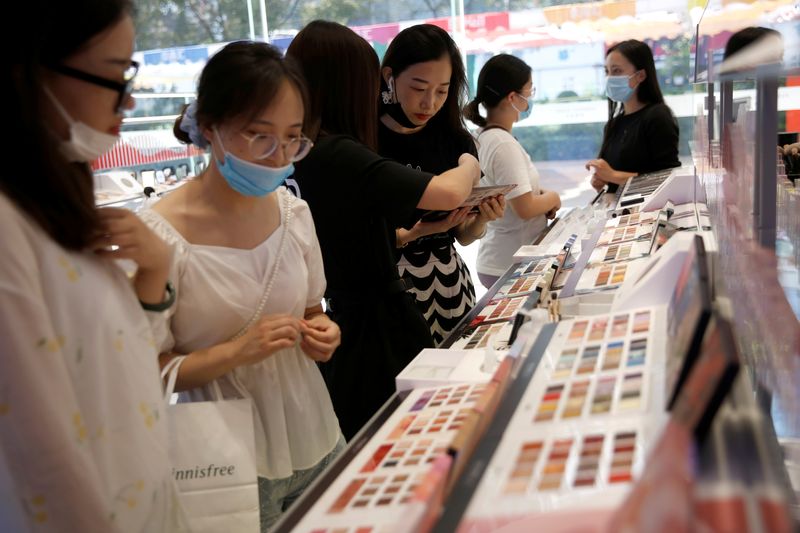By Casey Hall
SHANGHAI (Reuters) - Expensive beauty hauls are a thing of the past for Evelyn Zhu. The Chinese branding professional says she now only spends on skincare essentials, joining millions of other consumers who have cut back on cosmetics in the world's second biggest market.
"In recent years we all bought so many products," the 32-year-old from the affluent eastern city of Hangzhou said. "My bathroom cupboard is full, it's hard to say I need much more."
This restraint, which has taken hold amid a slowing economy, spells bad news for global firms such as L'Oreal, Estee Lauder (NYSE:EL) and LVMH who for years banked on China's $52 billion beauty market for growth.
Regional brands such as Japan's Shiseido, which counted China as its top market for years, are also struggling.
But while the economic woes have certainly weighed on sales, analysts say the main issue facing the multinationals is their slowness to adjust to the shifting priorities of consumers, who have become more discerning about what they buy and are increasingly finding that local brands are more suited to their needs.
"What Chinese consumers are still keen to spend on are high efficacy products," said William Lau, chief executive of multibrand beauty retailer Bonnie and Clyde, which stocks luxury international brands including Chantecaille and 111skin.
"What you're seeing is a downgrade in lifestyle-driven luxury and premium brands," he added.
Botanee Biotech's sensitive skincare brand Winona is one of the beneficiaries of this paring back.
The Chinese brand, which is priced at around the same level as L'Oreal products, is known for combating redness, a concern that marketing firm iResearch reported affects two-fifth of women. Analysts from CMB International estimate Botanee's revenue will grow almost 18% this year to 5.9 billion yuan ($824 million), with Winona responsible for most of these gains.
By comparison, sales for the global beauty giants are expected to fall.
DEEP DISCOUNTS
An analysis from brokerage Jefferies showed first half China sales down 8% at LVMH's beauty division, while sales at Estée Lauder Companies, which counts on China for one-third of its business, fell 12 percent over the same period.
Shiseido reduced its full-year profit forecast in November on slower China demand, which has also been hit by a boycott by some consumer of Japanese products following the release of treated radioactive wastewater in August.
L'Oreal, Estee Lauder and Shiseido did not respond to a request for comment.
These results also come off the lower base of 2022, when the combined colour cosmetics and skincare markets in China lost 9.5% of their value, data from Euromonitor shows.
While the market research firm expects growth of around 6% this year, it forecast won't get back to its 2021 market size of $54.4 billion until 2025.
So far, the multinationals have responded to the slowdown by offering deep discounts of up to 40% and gifts during peak shopping events such as the annual online Singles Day festival, but analysts say the data shows even that isn't really helping.
Luxe skincare brand La Mer, which rarely discounts, gave so many gifts-with-purchase over Singles Day that every sale resulted in almost the same amount of product being given away.
Independent data firm Syntun estimated that GMV, or gross merchandising volume, of beauty and personal care fell 6% year-on-year across all online shopping platforms. GMV is commonly used proxy for sales among e-commerce operators.
"The biggest global names have seen their Tmall GMV decrease by about 40% on average during 11.11," said Jacques Roizen, the Shanghai-based managing director of consulting at Digital Luxury Group, a digital agency for luxury brands.
"Now we see you don't have discounting as an acceleration lever you can press to go deeper or wider, because they're already maxed out," Roizen added.
Gregoire Grandchamp, co-founder of Next Beauty, a brand management partner for niche beauty players looking to grow in the China market, said the discounts offered by the beauty brands online this year have been "insane".
But while these larger brands are better able to compete online than smaller companies that lack their marketing budgets, they are not immune to the slowdown in demand.
According to Grandchamp, the sooner they adjust to China's new normal of single-digit growth rather than chasing the growth of yesteryear with brand equity-eroding discounts, the better.
"I think the way groups like L'Oreal will react will be to say, Okay, maybe it's better not to have this euphoric growth, but to be more in a more rational market," he said.
($1 = 7.1608 Chinese yuan renminbi)
